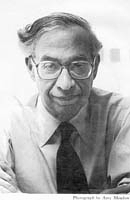
Donald Allen Wollheim was an American science fiction editor, publisher, writer, and fan. As an author, he published under his own name as well as under pseudonyms, including David Grinnell, Martin Pearson, and Darrell G. Raynor. A founding member of the Futurians, he was a leading influence on science fiction development and fandom in the 20th-century United States. Ursula K. Le Guin called Wollheim "the tough, reliable editor of Ace Books, in the Late Pulpalignean Era, 1966 and '67", which is when he published her first two novels in Ace Double editions.

John Kilian Houston Brunner was a British author of science fiction novels and stories. His 1968 novel Stand on Zanzibar, about an overpopulated world, won the 1969 Hugo Award for best science fiction novel and the BSFA award the same year. The Jagged Orbit won the BSFA award in 1970.
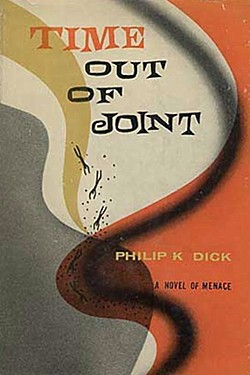
Time Out of Joint is a dystopian novel by American writer Philip K. Dick, first published in novel form in the United States in 1959. An abridged version was also serialised in the British science fiction magazine New Worlds Science Fiction in several installments from December 1959 to February 1960.

Starship Troopers is a military science fiction novel by American writer Robert A. Heinlein. Written in a few weeks in reaction to the US suspending nuclear tests, the story was first published as a two-part serial in The Magazine of Fantasy & Science Fiction as Starship Soldier, and published as a book by G. P. Putnam's Sons on November 5, 1959.
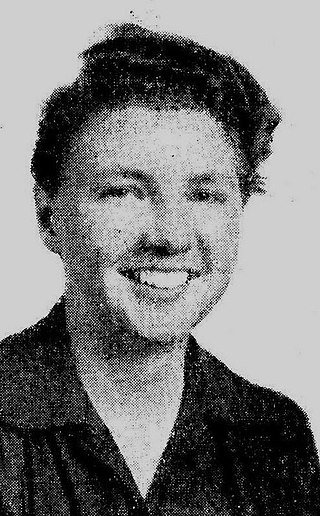
Leigh Douglass Brackett was an American science fiction writer known as "the Queen of Space Opera." She was also a screenwriter, known for The Big Sleep (1946), Rio Bravo (1959), and The Long Goodbye (1973). She worked on an early draft of The Empire Strikes Back (1980), elements of which remained in the film; she died before it went into production. In 1956, her book The Long Tomorrow made her the first woman ever shortlisted for the Hugo Award for Best Novel, and, along with C. L. Moore, one of the first two women ever nominated for a Hugo Award. In 2020, she posthumously won a Retro Hugo for her novel The Nemesis From Terra, originally published as Shadow Over Mars.

Damon Francis Knight was an American science fiction author, editor, and critic. He is the author of "To Serve Man", a 1950 short story adapted for The Twilight Zone. He was married to fellow writer Kate Wilhelm.

Abraham Grace Merritt – known by his byline, A. Merritt – was an American Sunday magazine editor and a writer of fantastic fiction.
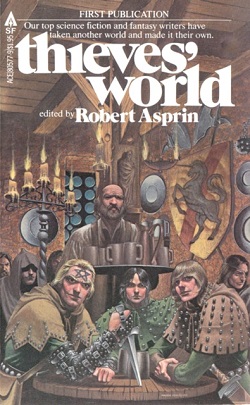
Thieves' World is a shared world fantasy series created by Robert Lynn Asprin in 1978. The original series comprised twelve anthologies, including stories by science fiction authors Poul Anderson, John Brunner, Andrew J. Offutt, C. J. Cherryh, Janet Morris, and Chris Morris.
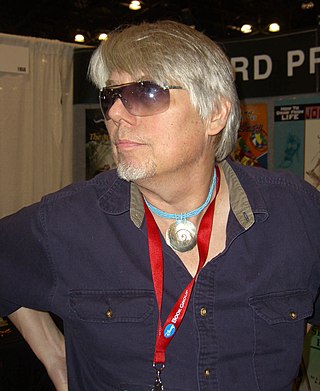
Frank Brunner is an American comics artist and illustrator best known for his work at Marvel Comics in the 1970s.
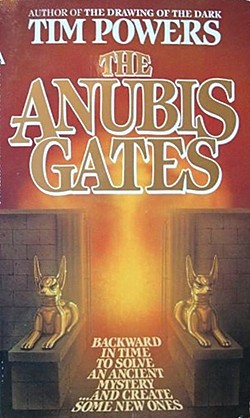
The Anubis Gates is a 1983 time travel fantasy novel by American writer Tim Powers. It won the 1983 Philip K. Dick Award and 1984 Science Fiction Chronicle Award. The plot concerns an English professor, who participates in a time travel experiment and ends up trapped in the 19th century. The novel was influenced by Mayhew's London Labour and the London Poor and, to a lesser degree, the works of Charles Dickens.
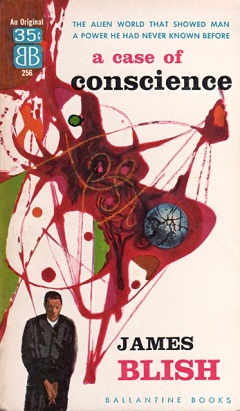
A Case of Conscience is a science fiction novel by American writer James Blish, first published in 1958. It is the story of a Jesuit who investigates an alien race that has no religion yet has a perfect, innate sense of morality, a situation which conflicts with Catholic teaching. The story was originally published as a novella in 1953, and later extended to novel-length, of which the first part is the original novella. The novel is the first part of Blish's thematic After Such Knowledge trilogy and was followed by Doctor Mirabilis and both Black Easter and The Day After Judgment.
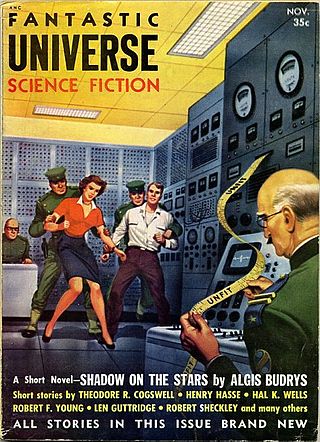
Fantastic Universe was a U.S. science fiction magazine which began publishing in the 1950s. It ran for 69 issues, from June 1953 to March 1960, under two different publishers. It was part of the explosion of science fiction magazine publishing in the 1950s in the United States, and was moderately successful, outlasting almost all of its competitors. The main editors were Leo Margulies (1954–1956) and Hans Stefan Santesson (1956–1960); under Santesson's tenure the quality declined somewhat, and the magazine became known for printing much UFO-related material. A collection of stories from the magazine, edited by Santesson, appeared in 1960 from Prentice-Hall, titled The Fantastic Universe Omnibus.

Blue Light is a science fiction novel by American writer Walter Mosley, published in 1998 by Little Brown & Co.

Flowers for Algernon is a short story by American author Daniel Keyes, later expanded by him into a novel and subsequently adapted for film and other media. The short story, written in 1958 and first published in the April 1959 issue of The Magazine of Fantasy & Science Fiction, won the Hugo Award for Best Short Story in 1960. The novel was published in 1966 and was joint winner of that year's Nebula Award for Best Novel.

Satellite Science Fiction was an American science-fiction magazine published from October 1956 to April 1959 by Leo Margulies' Renown Publications. Initially, Satellite was digest sized and ran a full-length novel in each issue with a handful of short stories accompanying it. The policy was intended to help it compete against paperbacks, which were taking a growing share of the market. Sam Merwin edited the first two issues; Margulies took over when Merwin left and then hired Frank Belknap Long for the February 1959 issue. That issue saw the format change to letter size, in the hope that the magazine would be more prominent on newsstands. The experiment was a failure and Margulies closed the magazine when the sales figures came in.

Susanna Mary Clarke is an English author known for her debut novel Jonathan Strange & Mr Norrell (2004), a Hugo Award-winning alternative history. Clarke began Jonathan Strange in 1993 and worked on it during her spare time. For the next decade, she published short stories from the Strange universe, but it was not until 2003 that Bloomsbury bought her manuscript and began work on its publication. The novel became a best-seller.

The Obelisk Gate is a 2016 science fantasy novel by N. K. Jemisin and the second volume in the Broken Earth series—following The Fifth Season, and preceding The Stone Sky. The Obelisk Gate was released to strong reviews and, like its predecessor in the series, won the Hugo Award for Best Novel.
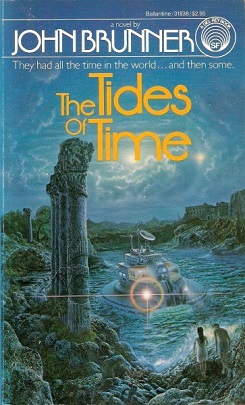
The Tides of Time (ISBN 0-345-31838-2) is a science fiction novel by John Brunner. It was first published in the United States by Ballantine Del Rey Books in 1984. The novel tells the story of two people on an isolated island, each time they awoke from sleep, they lived a different life in a different time.

Biology appears in fiction, especially but not only in science fiction, both in the shape of real aspects of the science, used as themes or plot devices, and in the form of fictional elements, whether fictional extensions or applications of biological theory, or through the invention of fictional organisms. Major aspects of biology found in fiction include evolution, disease, genetics, physiology, parasitism and symbiosis (mutualism), ethology, and ecology.

Horror Wears Blue is a science fiction novel by American writer Lin Carter, the fifth and last in his "Zarkon, Lord of the Unknown" series. It was first published in hardcover by Doubleday in November 1987. An ebook edition was issued by Thunderchild Publishing in December 2017.




















